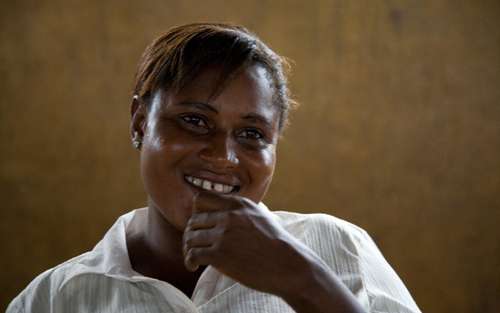One morning Joanna Manu, 38, went to her farm to find that mining company workers had uprooted one of her palm trees. The damage was caused by a mistaken attempt to gain access to an operational site. Manu is a resident of Dumase, one of the communities in Ghana affected by the activities of Golden Star Resource Limited, a US/Canadian gold prospecting and mining firm operating in Ghana since the late ‘90s.
The company previously had lost a court case to Manu when she was accused of trespassing onto what she explained was her own farm land. After hearing of her complaints over the loss of her palm tree, the company immediately opted to negotiate paid compensation rather than defend itself in a messy court case.
In a community where many facing situations such as Manu’s would have resigned to fate, it is seen as a triumph for human rights awareness and activism for Manu to insist on adequate compensation. She negotiated for and actually got paid the sum of 500 Ghanaian Cedi (about $350) for her loss. This is the highest sum ever paid as compensation for the loss of any crop in Ghana.
“The company knows that I know my rights and so they are very careful when dealing with me,” said Manu.
Ghana’s chamber of mines, an association of mining companies, generally sets levels of compensation in such cases. Normally, this body recommends payment of five Ghanaian Cedi (about $3) for a palm tree.
Instead, Manu demonstrated that palm trees are very important to the livelihoods of the people of Dumase because of their multiple uses—namely they produce palm oil, palm kernels, sponges, brooms, palm wine, and palm fronds.
“We have a cause to fight for and a goal to achieve,” says Manu. “Sometimes people are not happy with what you are trying to achieve, but you shouldn’t let opposition stop you.”
Ghana, like most of West African countries, is home to abundant mineral resources. But this has not reflected on the lives of the vast majority of people who remain poor. Oxfam America has been working through its partners like the Wassa Association of Communities Affected by Mining (WACAM) in Dumase and other communities to enlighten and empower local people to assert their rights when interacting with mining companies.
“Manu has, in fact, fought against the injustice of miners and their Compensation Committee,” says Daniel Owusu-Koranteng, the Executive Director of WACAM. “She upheld her right in line with the provisions of the Mining Act.”
Manu is one the beneficiaries of WACAM’s training programs and regularly puts her newfound knowledge to good use.
“It’s important to empower women in mineral-bearing communities so that they can gain skills, confidence and the ability to make decisions about their lives,” says Eva Kouka-Quenum, Oxfam America’s West Africa Extractive Industries Program Officer.
